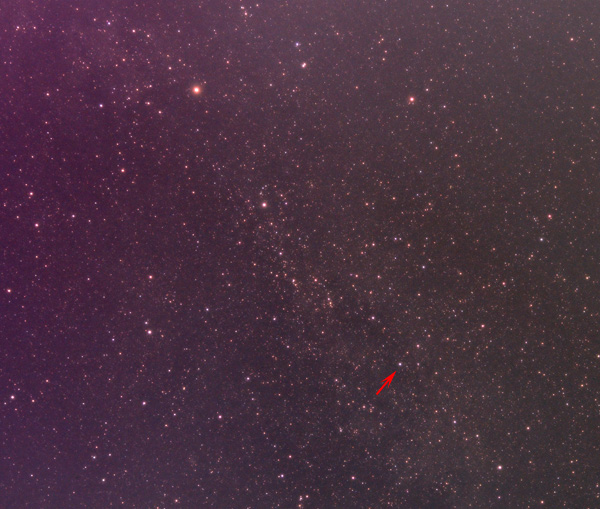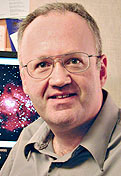 |
|
|
Astrophotos:
Chi Cygni
M22
M27 (Dumbbell Nebula)
Webb's Horseshoe
Sagittarius
 For more topics, scroll down, press Ctrl-F to search the page, or check
previous months.
For more topics, scroll down, press Ctrl-F to search the page, or check
previous months.
BOOK SALE - I'm selling off some scholarly books via Amazon Marketplace. Have a look!

|
2006
September
26-30
|
Beware the hungry ATM!
The
UGa
Linguistics Conference is starting up and I'm closing out the September blog early.
My long-promised astrophotos from two weeks ago will appear here in early October.
In the meantime, one odd incident to report...
Cathy suffered an unusual
stupid bank trick
yesterday (Sept. 27),
though not a malicious one.
She walked up to the automatic teller machine on the downtown Bank of America building,
and inserted her card, and the machine promptly swallowed it.
ATMs have a mechanism to swallow cards that they think are being misused.
There was, of course, nothing wrong with Cathy's card or account, so she went inside.
The bankers said, "Oh, yes, that machine does that a lot," or words to that effect,
and to her surprise were not able
to open up the machine and give her the card back.
Instead they issued her a temporary card, and a replacement card is in the mail.
But why don't they either fix the ATM or mark it out of order?
If I had encountered a malfunctioning ATM and hadn't been able to go right
into the bank and report it, I might well have called the police
because there are so many
scams
based on tampering with ATMs.
Permanent link to this entry


|

|
2006
September
25
|
Buying a book or buying a theater ticket?
[Revised September 29.]
The British Library (which is the UK's equivalent of the Library of Congress)
has issued a
manifesto
calling for legislation to rein in Digital Rights Management (DRM)
and, in general, to rein in the strict licensing conditions that often apply to
downloaded music and movies.
The underlying issue is the radical difference between copyright and
performance licensing. When downloaded recordings are involved, the two mix
in an awkward way.
The music industry wants to view downloading as
performance licensing, like buying a theater ticket.
It allows you only to view a specific set of performances.
These might, indeed, be an unlimited number of performances on a specific computer,
but, ultimately, the performer (or rather producer) has the complete right to set limits.
You get what they agreed to give you, and nothing more.
Copyright law revolves around something rather different.
In themselves, traditionally, copyrights
cannot restrict reading or viewing, only redistribution,
and even then, the limits are not absolute.
Under current copyright law, a copyright owner can't stop a
critic from quoting small parts of the copyrighted work in order to discuss it,
nor stop a library from copying it in order to preserve it.
The traditional idea is that apart from legislation, there would be no
copyrights at all and it would be legal to copy and redistribute
anything you want.
Copyrights are granted by Congress for the benefit of society, to help
the publishing industry make money because publishing is a desirable thing.
At least, that's how the framers of
our Constitution saw it.
Now the problem is, an audio recording is in some ways a performance and in other ways
a copyrighted work.
For books, a copyright is sufficient, but for audio recordings, there has always been
some element of performance licensing; phonograph records are usually sold subject to the
condition that they not be played on the radio, or otherwise used commercially,
without payment of further royalties.
Copyright law supplies only part of the mechanism to back this up; but it's partly a
contractual relationship between the seller and the buyer of the record.
Anyhow, I'm fully behind the British Library on this issue.
I think digital media licensing needs
to be standardized and some types of fair use need to be established by legislation,
especially the right of libraries and individuals to preserve
their own properly licensed material by copying it in any appropriate way.
Otherwise, although I can listen to my great-grandmother's phonograph records,
it's quite possible my great-grandchildren will not be able to listen to my
downloaded music, even if they possess the files and the software,
because the theater-ticket-like license will have run out.
And if the licensor disappears or simply refuses to renew licenses,
some of today's music will be lost to posterity even though the media survive.
Permanent link to this entry


|

|
2006
September
21-24
|
Alive but busy
We're in the late-September crunch. North Georgia is having its annual two weeks of good weather
in between summer and winter, and I've been doing lots of things other than writing blog entries.
So has the whole University, which is positively frothing over with scheduled activity.
The big thing this coming week is the UGa
Linguistics Conference. The online world may not see much of me until that's over.
For me, the high point of the conference is that one of the speakers is
Ray Jackendoff,
who, over the years, has progressed
from being Chomsky's best graduate student to Chomsky's most insightful critic.
For a sample of his work, see
this,
and, if you're a schoolteacher,
this.
Meanwhile, our student newspaper is warning people who might not have realized that
if you
write a blog, people might read it. Who would have guessed?
And bad computer
programming can crash a Segway. Not your usual kind of computer crash...
And Sharon is a car owner. As soon as her vintage but indestructible Volvo gets out of the shop,
she'll be driving around Athens, encased in what seem to be tons of Swedish steel.
(Thanks to her grandparents for financial assistance!)
My excellent batch of astrophotos from last week will be posted here, eventually,
I promise.
Permanent link to this entry


|

|
2006
September
20
|
Too much security is a bad thing
[Minor corrections Sept. 21. Updated 2011.]
Readers will recall that
last June our
Discover credit cards
were cancelled without warning, not because of any misdeed on our part,
but because of the CardSystems security breach.
Well... They've done it again.
This morning Melody and Sharon were in Atlanta and Sharon came down with
a migraine headache. Melody went to a nearby CVS Pharmacy to get medicine for her,
and the Discover card was declined.
Why?
What they told us, by phone, is that the simple act of using a credit card
60 miles away from home triggered a "fraud alert" and caused the card to
be locked down.
Huh?
We've concluded that we can't trust this credit card because it's been
shut down on us twice now without warning.
I should add that we always pay our bills on time, stay well below the credit limit,
and have an extremely high credit score.
I'm glad they noticed that the card was being used in an unusual place, but why not
just tell the merchant to ask for identification because of the unusual circumstances,
not cut off the card altogether?
It has just occurred to me that they may be
trying to lose us as a customer.
We collect their generous paybacks (1% on most purchases)
but, for about a year and a half, we've not paid them any interest because we
only use this card for expenses that are paid off monthly.
Permanent link to this entry


|

|
2006
September
17-19
|
Globular cluster M22
As you can guess, I'm almost too busy to write blog entries, but...

This is a very rough rendition of a picture of the
globular cluster M22
that I took the other night. This is just one frame, with no stacking or
dark-frame subtraction — a 3-minute exposure with a Canon Digital Rebel
through an 8-inch telescope at f/6.3. A much better-processed version of this
picture will appear in this blog later.
Permanent link to this entry


|

|
2006
September
16
|
Minting their own money?
Astrophotos are coming tomorrow. Meanwhile, look at
this news story about how
this organization
[link corrected Sept. 19]
is
minting its own coins ("Liberty Dollars") and promoting them as an
alternative to U.S. currency.
(Critique by the Southern Poverty Law Center
here;
thoughtful essay in support of the idea
here.)
On the one hand, it's illegal to falsely pass off unofficial coins as legal tender,
or require people to take them in payment of debts.
Only the government can make money which everyone is required to accept.
But on the other hand, merchants are free to accept tokens or barter any time they want to.
In the 1960s, Las Vegas was full of silver-dollar-sized tokens.
A century earlier, lots of penny-sized one-cent tokens circulated with advertising on them.
As long as nobody thinks these are coin of the realm
(pardon me, legal tender of the republic), I don't see anything wrong with it.
And on the third hand, the people who make the "Liberty Dollar" seem to have an outmoded view
of economics.
They think silver is real money and government documents aren't.
Actually, the government is accountable for how it regulates the money supply,
and the silver mines aren't.
The industrial demand for silver may be about to plummet
due to the decline of film photography (silver is used in film).
If so, the value of silver will drop too.
If you think silver can be relied on to retain its value,
look at
this chart
or, even more strikingly,
this inflation-corrected one.
The Liberty Dollar may be the doing of a few investors who want to take advantage of the
temporary bull market in silver.
Having said that, let me add that commodity-denominated money, issued by private banking
organizations, may be the wave of the future.
It would be inflation-proof.
But I'm convinced that silver is not the right commodity.
Instead, use a combination ("basket") of many commodities that people actually need.
Finally, there's yet another twist to the Liberty Dollar.
The maker is selling Liberty Dollars
to "associates" for less than face value — about $16 for 20 Liberty Dollars
as of today.
And, if I've calculated right,
the bullion value of a Liberty Dollar is presently about 54 cents.
So why is a Liberty Dollar supposed to be worth a dollar?
That might be the biggest reason a few people are facing criminal charges
for trying to spend them. They aren't dollars.
Permanent link to this entry


|

|
2006
September
13-15
|
Still alive...
It's September, so do all your work right now!
The University is in one of its frenzies.
The academic year started a month ago, and now everybody is suddenly realizing they need
to be doing something.
So I'm too busy to write a blog entry.
Read Jeff Duntemann's entry for today instead.
Also: After nearly a year, I've finally gotten a chance to go out into the country and
photograph the sky. (On two consecutive nights, no less.)
Several very good astrophotos will appear here soon.
Permanent link to this entry


|

|
2006
September
12
|
What the Bible really says about the Creation
I've just read Snoke's
A Biblical
Case for an Old Earth and was struck by its success as a work of exegesis, useful to anyone who is
curious about what the Bible actually says, whether or not they personally consider the Bible authoritative.
I submitted the following review to Amazon.
|
People of all persuasions, conservative and liberal, will find this book useful as a carefully reasoned exposition of what the Bible actually says.
All too often, we bring modern presuppositions to the Bible and misunderstand it. For example, we see the word "earth" and immediately imagine a globe seen from outer space. That was not part of the ancient Hebrew mindset. On that basis, Snoke argues convincingly that the Bible says Noah's flood was local (it covered "the land," not the entire planet). Also, the creation story in Genesis 1 is clearer if we understand that it describes the appearance of things seen by a person on the ground, not an aerial or outer-space view.
Snoke is very conservative; he does not accept Darwinian evolution at all. His conservatism makes the book all the more useful because he obviously is not trying to impose Darwinism or anything else onto the Bible. He is just trying to read it in the light of present-day knowledge of history, archeology, and physical science.
He does a good job of disposing of fundamentalist folklore. Young-earthers often add to the Bible a remarkable assortment of notions not explicitly taught there, such as the vapor canopy theory, an assortment of miracles associated with Noah's Ark, and so forth.
He also makes an interesting observation about the "appearance of age" theory (God created the earth with the appearance of age). Suppose God created Adam miraculously with a 30-year-old body. That would make sense because in order to exist, Adam had to exist at some stage of physical maturity. But if God had created Adam with 30 years of false memories, that would make God a deceiver. In the same way, it does not seem plausible that God would create the universe with the "appearance of age" including spurious evidence for huge numbers of specific prehistoric events, from supernovae down to the life and death of individual animals.
In passing, he remarks that it is a breach of scientific ethics for young-earthers,
claiming to be scientists,
to take their scientific claims directly to popular audiences,
often with church sanction, without submitting them to any kind of expert criticism.
He also suggests an obvious possibility why so many people in the past believed in dragons:
a few dinosaur skeletons must have been found,
and recognized as reptiles, at various places in ancient times.
In short: This book is very strong on logic in a field where shoddy reasoning is common.
It is the best exegesis of Genesis 1-2 that I've ever seen.
|
Permanent link to this entry


|

|
2006
September
11
|
Five years at war
Five years ago today I came downstairs, looked at the TV, remarked, "Look at that, the World
Trade Center is on fire," and then, as events unfolded, went to the office, told the staff that
they need not stay there if they didn't feel safe, and told the foreign graduate students that they
still had the same freedoms as before, and that I (and the American police)
would stand up for them if any misguided patriots
gave them trouble.
That was the beginning of the War on Terrorism, and I wonder how much freedom we have permanently
lost. Restrictions on air travel and entry to the U.S. keep increasing.
I thought things like Guantanamo and even parts of the Patriot Act
would last only a few weeks and then get overturned by courts. Today, the prisoners are
still at Guantanamo, still without due process of law, and the Patriot Act is still in place.
My deepest concern is the apparent erosion of parts of the U.S. Constitution.
(I should add, contrary to some foreign critics, that the flow of information is not
restricted. I've seen a poster in Europe that equates the Patriot Act with book-burning.
Falsch. There are no restrictions on what we read, listen to, say, or write.)
We're really fighting two wars (against al-Qaeda and against Iraq) and it's hotly disputed whether
the two are really connected. Conditions that justify one might not justify the other.
In a situation like this, we have had no choice but to trust our leaders, who apparently have
information that has not been made public. It may take decades for the public to find out what
was really going on. Congress has certainly supported the war(s) much more solidly than the public has.
History will judge our leaders very harshly if their actions turn out to have been unwarranted.
What my foreign friends don't always appreciate is that opposition to the war is not "on the
menu" in American politics. When we vote, the war isn't one of the issues.
Bush was re-elected in 2004 because his opponent, John Kerry,
offered no real alternative on anything important, and certainly not this.
At the same time, there's one shallow kind of opposition to the war that I can't stomach.
We can't just say "war is yucky" and stay away from it out of mere distaste.
We were attacked.
Sometimes the innocent have to be defended with deadly force.
As for Iraq, the justification for invading is not clear from publicly available information,
but we appear to have deposed a cruel dictator who wanted a fight.
Certainly, the fact that the war in Iraq
produced a negative number of refugees is significant; lots of Iraqis had fled Saddam and
have headed back home.
The Treaty of Westphalia, 1648, is why we generally assert that nations shouldn't
intervene in each other's internal affairs.
The problem is, sometimes this means not defending the innocent.
I wonder how much death and suffering could have been prevented if someone
had intervened in Germany in the 1930s, and whether, to this day,
people would still be saying it was unjustified.
I think it was the elder George Bush who said, in a TV interview many years ago about
secret agents and covert action, "You never hear about the wars we prevent."
(P.S. I didn't watch the ABC-TV docudrama
because I don't think it's likely to be accurate, and I
don't want to learn about controversial events from fictionalized portrayals.
But I also don't approve of the Clinton ex-administration's attempts to
put improper pressure on ABC-TV
with such things as threats about broadcasting licenses.
We don't censor the news media in this country, even when they make fools of themselves!)
Permanent link to this entry


|

|
2006
September
10
|
Brain research and the minimally conscious state
Researchers at Cambridge
have used functional magnetic resonance imaging (fMRI)
to show that a person in a "vegetative state" can understand speech and,
on request, imagine herself doing specific activities.
(Bibliography entry here;
Adrian Owen's home page here.)
We don't know if this patient is common or a rare case; we also don't know whether she was quite
conscious. (A person who is three quarters asleep could still show brain wave responses to some simple instructions.)
But it does mean that our concerns about
Terri Schiavo last year were very much to-the-point.
Dr. Owen is also working on EEG-based communication devices for people who are completely paralyzed
and "locked in."
I'm interested in this too.
Morse code with brain waves would be a slow way to talk, but a lot better than nothing at all!
Permanent link to this entry
Turbo blunder?
According to
Jeff Duntemann, not only does Turbo Explorer have a ghastly
installation procedure, it fundamentally
won't support more than one programming language on the same computer.
That, according to him, is a deep technical limitation, not a marketing restriction.
What a blunder! Don't they realize that some of us want Delphi for Win32 and Delphi for .NET
and C#?
The whole thing strikes me as very strange. I have no doubt that, internally, the new Turbo suite
works very well, but what about its interaction with the machine that it's installed on?
It has some attributes that would normally indicate software hastily ported from some other OS
by someone who doesn't know much about Windows. What gives?
Permanent link to this entry


|

|
2006
September
9
|
Disk crash and Seagate mystery
The hard disk in Eos, our home server, crashed suddenly on Thursday and we're still busy
reconstructing it. No vitally important data have been lost, but the backup system was
not as neat as it might have been.
The disk was a 120-GB Seagate purchased back in May.
I like Seagate 7200-rpm drives because they run so quietly, but I was taken aback when
one died so young.
I went to www.seagate.com to start a warranty claim,
typed in the serial number of the disk, and was told that it was made for sale to an OEM
(equipment builder), not directly to consumers.
So I used my scanner to take a picture of the drive itself (which has a big white label with
serial numbers) and the proof of purchase, sent this information to Seagate, and they're going
to honor the warranty.
Meanwhile, I went out and bought another disk to get the computer back up immediately.
It's a Seagate, of course. Am I a fool?
And on its big white label is an assertion that it was made for OEM sale, even though
I got it in a box at Best Buy, with a sticker that says "New 5-Year Warranty."
Not being too much of a fool, I'm saving as much of this material as I can, and I've used
the scanner to take a picture of all these things together.
Meanwhile, Eos was at least partly up and running almost immediately because I had simply kept
the old hard disk from before the upgrade in May. I put the old disk back in, got the machine
running, cloned the old disk onto the brand-net one, and trucked on.
I regret that I didn't have a clean, full backup of the whole computer. I need to make those more
often. Meanwhile, save your old hard disks. They are cheap and foolproof backups.
I'm about to transport about 3 of our old hard disks to my office and store them there.
Permanent link to this entry
Financial disaster?

Why did the Fidelity Real Estate Investment Fund (FRESX) drop 8.3% on Friday,
while most of the market, including several other real estate funds,
had a middling good day, rising a fraction of a percent?
That had me worried for a while. Eventually I found out that Fidelity had
paid a distribution (a dividend), which is subtracted from the holdings of the fund
and therefore drives down the share value.
Of course, since it's paid to the shareholders, it doesn't cost us anything.
In fact, correcting for that change, we're ahead something like 0.2% for the day.
Permanent link to this entry
Football money
Since I often gripe about the way football games disrupt the University,
I'm happy to report that the Athletic Association (which is separate from the
University itself) is sharing some of the wealth.
The Athletic Association has pledged $2 million to the University,
over four years, to endow,
among other things, seven chaired professorships.
If I remember right, this is slightly more
than 1% of the Association's expected income for that period.
Meanwhile, according to Georgia Magazine, private giving to the University
has surged to more than $108 million in FY 06.
People also make donations to the Athletic Association; these totaled almost $35 million
for the same year.
Permanent link to this entry


|

|
2006
September
8
|
Underwhelmed?
Turbo Delphi has left one of its most optimistic advocates
underwhelmed,
largely because of an incredibly complicated, 1990s-ish installation procedure.
It's also encountering some hostility because it uses .NET (even the version that doesn't
generate .NET executables). To which Jeff replies very sensibly that .NET is now part of Windows,
so why can't use it?
I recently saw a newsgroup thread with people asking why .NET is better than the Win32 API.
I'll tell you why: Functionality aside, .NET gives you a lot more error checking.
The .NET interface knows the types of the data you're passing to it.
Win32 expects you to create big data structures (like BITMAPINFOHEADER) and pass
pointers to them.
If you do it wrong, the program crashes and nobody knows why.
I hope the era of pointer-based, crash-prone software will soon end.
Software doesn't have to be unreliable and insecure.
Mainframe software in the 1970s wasn't.
Permanent link to this entry
Medical miscellany
While looking through medical journals for items relevant to my research, I found a few items that
definitely weren't, but were too interesting to ignore.
Bear in mind that research results don't always hold up. With that in mind...
Maybe it's not so bad to be fat.
This review of other studies
found that overweight people survived coronary artery disease better than underweight or
even normal-weight people.
Three caveats. First, this was a study of people who had coronary artery disease;
it doesn't address the risk of getting it.
(So I'm not going to start feasting just yet.)
Second, the authors point out that weight does not equal fatness; the underweight and
normal-weight groups included people with underdeveloped muscle tissue.
(Some very thin people are very sedentary; they're just weak.)
Third, it occurs to me that some of the patients must have been undernourished in some way,
and those would all have fallen into the under- and normal-weight groups.
Meanwhile, another
team reports
that Ditropan, the drug you see advertised on TV as a prescription treatment for
overactive bladder, causes significant memory impairment which is not noticed by the patient
in aging adults
(and presumably also people of other ages).
That's just what you'd expect from its effect on neurotransmitters,
in this case acetylcholine.
Hmmm... Quite a price to pay for not having to go to the bathroom so often.
Last, here's
advice
to doctors on
how to handle a difficult patient.
Useful to any of us who have to deal with customers, students...
or who may be a difficult patient!
Permanent link to this entry


|

|
2006
September
5-7
|
Post-Labor-Day flurry
Labor Day is past, and everybody who goofed off all summer has suddenly resumed working,
and we're in a flurry of activity. Today I have only a couple of short notes.
Turbo Delphi (for .NET) and Turbo C#
are finally out, and you can get them free (just one of them per machine, and only installed for one user).
You can, of course, buy them for use without strings attached.
Thus the Turbo Pascal lineage continues.
Personally, I think Delphi was reincarnated as C# and Borland is a couple of years behind Microsoft
(indeed, Turbo C# uses .NET 1.1, not 2.0, and thus lacks useful features such as DataGridView).
But I'm glad to see the Delphi language being kept alive.
The leader of the Human Genome Project believes, as I do, that
evolutionary
biology is compatible with Christianity. Good for him. It is very important for us Christians to let the public
know that
not all of us are young-earthers.
In fact, not many are, if you count only people who know enough to
have a considered opinion.
Meanwhile,
here's a book
that works out, in detail, why believing in an old earth does not mean throwing out the Bible.
We need more of this kind of thing. I haven't read the book yet,
but the first Amazon reviewer (Paul Bruggink) sums it up handily.
Permanent link to this entry


|

|
2006
September
4
|
The Dumbbell Nebula
Here's M27, the Dumbbell Nebula (actually, I think, a doughnut shape like M57 but viewed from the edge).
Stack of five 3-minute exposures with my 8-inch telescope at f/6.3,
Canon Digital Rebel camera, through the murky summer skies of Athens, Georgia.

Copyright 2006 Michael A. Covington. Licensing available.
This is the center of a larger image of which prints suitable for framing are available.
Color-corrected picture posted December 20.
Technical lesson learned: The median of five images (that is, the median value of every
corresponding pixel, comparing all five) comes out much smoother than the mean of two or three.
This picture shows the newly discovered
variable star near minimum
(15th magnitude, which means the picture reaches down to about 17th).
Reportedly, this variable was discovered by someone idly comparing two pictures
of the same nebula in different issues of a magazine!
People should look at pictures more.
Permanent link to this entry
Webb's Horseshoe

Color-corrected picture posted December 20.
I didn't discover this horseshoe-shaped chain of stars, but I did give it its name.
T. W. Webb pointed it out about 150 years ago in his book Celestial Objects for Common Telescopes.
In my own book,
Celestial Objects
for Modern Telescopes, I pinned the name "Webb's Horseshoe" on it.
A very nice web page about this asterism has been
made by Jeff Burton.
Same telescope and setup as previous photo, but only three 3-minute exposures were stacked.
Permanent link to this entry
Sagittarius
Finally, a picture of the star clouds of Sagittarius, setting and about to run into a tree,
just because this is one of my favorite things to photograph.
(This is right side up; you are looking at the side of a tree, not the horizon.)

Permanent link to this entry


|

|
2006
September
2-3
|
Cygnus with an extra star

The long-period variable star Chi Cygni
is unusually bright right now, or at least it was on August 18,
when I took this picture.
It is fading now, but still visible to the unaided eye; its maximum occurred in early August.
This was taken with a Canon Digital Rebel and
Canon 28-mm f/2.8 lens at f/4, and the problem was that the
lens was too sharp — all the stars looked alike and the bright ones
didn't stand out.
To try to bring out the brighter stars, I superimposed the original image with two blurred copies
with different amounts of blur.
It would have been better to add some source of diffraction or diffusion to the original optical
system; crosshairs in front of the lens might have done the job.
Unlike film, digital sensors don't suffer halation (spreading of light), and bright
stars don't stand out nearly as much.
This was taken in a murky, third-magnitude sky, and I'm surprised the camera captured this much.
You can even see a little of the North America Nebula at the upper left.
Permanent link to this entry


|

|
2006
September
1
|
Happy new month...
It's September. I continue to be so busy that all I can blog today is a handful of
interesting web links...
Useful concept of the moment:
Secondhand stress.
It has more dimensions than the article mentions.
Have you noticed that some people's hobby seems to be getting you to worry about them?
I once watched the prayer requests in a Bible study class gradually turn into a collective
exchange of worries and gossip.
I think we have a moral duty to help people with real needs, but worrying is not help.
Either do the person some real good or, with a clear conscience, accept that their problem is not your problem.
Speaking of stress,
here's some
advice for
new law-school students.
And speaking of laywers, Professor Bainbridge started an interesting discussion of
bill-padding practices.
When I do computer consulting, I charge by the hour (in 0.1-hour increments), so this interests me.
I'm quite strict about never double-billing (that is, I never charge two clients for the same block of time).
And I would never falsify anything I report to a client about the amount of time a job is taking.
But I do bill for bill-preparation time (which is maybe 2% of my work, if that much), and I don't clock out
when I walk away from the desk briefly, still thinking mainly about the client's problem.
Numerous astronomical photos will be posted here in the next few days.
In the meantime, amuse yourself with this collection of
cats that look like Hitler.
As usual, the mind boggles.
Permanent link to this entry


|

|












